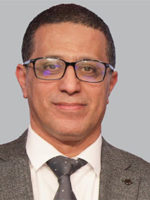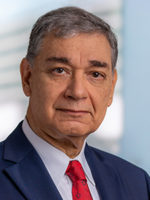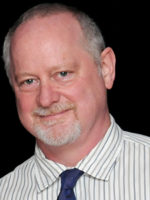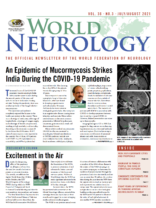 Riadh Gouider
Riadh Gouider
I trained at the Charles Nicolle Hospital in Tunis, and in La Pitié Salpêtrière Hospital in Paris. This mixture of learning and training encouraged me to explore global neurology.
My journey with the World Federation of Neurology (WFN) began in 1993 during the 15th World Congress of Neurology (WCN) in Vancouver. Since then, my enthusiasm and commitment to WFN has never wavered.
Being the national delegate of the Tunisian Society of Neurology for almost a decade (2005-2015) showed me how important a delegate can be as a crucial link between his national society and the international neurology community.
Appointed as a regional director for Pan-Arab region from 2008-2010 and regional director Africa from 2012-2015 taught me the crucial role of the six regions in WFN strategy and actions, especially when the neurology resources are scarce.
To support the WFN in its mission to promote global neurological education and training, I participated in the accreditation of three teaching centers : Rabat, Dakar, and Cairo.
Lately, I had the honor to be designated as the convenor of the first WFN/AFAN e-Learning Day, which took place in October 2020, the second will be held in November 2021.
My involvement on several committees of WFN: as a co-chair of the e-Learning Task Force, the Education Committee, the specialty groups, and the e-Communication Committee, provided me with invaluable insight into those committees’ functions, the development of their activities, and their positions within WFN.
The most important influence was my election for two terms as an elected trustee from 2014 to 2020. This position filled me with a strong sense of pride and gave me the chance to significantly contribute to the challenges the WFN has faced and the opportunities to participate in the activities of the WCN meetings.
I have had the honor of serving the WFN through a variety of roles.
I feel that I am experienced and honored to stand for the role of first vice president.
If elected, I pledge to support the mission of the WFN to contribute to the advancement of teaching and practice of neurology throughout the world.
I will focus on:
– Provision of access to quality training programs and teaching materials to neurologists, trainees, and health care professionals from all over the world through the e-learning capabilities.
-Creation of more teaching centers all over the world, especially Africa, Central and Southeast Asia, Latin America, parts of Eastern Europe, providing equal educational opportunities in regions with fewer neurologists.
-Strengthening relations among south and north countries and be an active contributor to the dissemination of information and scientific progress.
To further empower and strengthen the links of communications between WFN and regional organizations.
Enhance the cooperation of WFN with international organizations such as the WHO and neurological NGOs.
My fellow delegates, I am asking for your vote to be elected as first vice president. Regardless the results of the election, I promise to continue working for the WFN with the same enthusiasm and commitment. •
 Gustavo Román
Gustavo Román
I was honored by my nomination as candidate for vice president of the World Federation of Neurology (WFN) from the American Academy of Neurology and neurologists from Colombia, my homeland, Brazil, Chile, Honduras, Panama, Uruguay, Spain, and France.
My mentor, Prof. Charles Poser, who served as editor of World Neurology in 1960 instilled in me the importance of the WFN in a globalized world. Over four decades, I served two terms as elected trustee of the WFN and participated in numerous activities.
I was born in Colombia and as an intern encountered the challenges of neurologists working in tropical countries: confronting formidable diseases with minimal diagnostic tools and a limited therapeutic arsenal. With a scholarship, I studied at the Salpêtrière in France and learned the enduring value of clinical neurology and neuropathology. Back in Colombia, I was appointed neurology faculty and wrote two textbooks: Practical Neurology and Tropical Neurology.
I joined Texas Tech University as professor of neurology and interim chair of neurology. In 1990, I was appointed chief of neuroepidemiology at the National Institutes of Health (NIH). I published HTLV-1 and the Nervous System; contributed to the diagnostic criteria for vascular dementia and guidelines for epidemiological studies on epilepsy; I co-authored Neurocysticercosis: A Clinical Handbook and participated in a multinational study of epidemic neuropathy in Cuba. I chronicled this experience in the book Cuban Blindness: Diary of a Mysterious Epidemic Neuropathy.
I returned to teaching at the University of Texas San Antonio as professor of neurology, medicine (geriatrics), and geriatric psychiatry and established the Alzheimer Disease Clinic. In 2010, I was selected the “Jack Blanton Endowed Chair” to organize a new memory center at Methodist Neurological Institute where I currently serve as professor of neurology, Weill Cornell Medical College, New York, and Texas A&M College of Medicine.
At the beginning of the pandemic, in early 2020, as chair of the environmental neurology specialty group of the WFN, I proposed creating international neurological registries of COVID-19 among neurological societies worldwide (Lancet Neurology 2020;19:484). With the group, I wrote the first comprehensive review on the neurology of COVID-19 (J Neurol Sci 414 (2020) 116884). These efforts resulted in the formation of scientific groups, such as the global COVID-19 Neuro Research Coalition (Ann Neurol 2021;89:1059).
As vice president of the WFN, I pledge to continue addressing the needs of neurologists worldwide during this pandemic, with emphasis on education and accessibility to scientific information to better serve neurological patients. Nontraditional methods and creative solutions such as telemedicine that have proven effective during the pandemic may have myriad applications in regions of the world with few neurologists.
We must be ready for future challenges, and the WFN is the only institution capable of serving as link of union and coordinating core for neurologists around the world. As vice president, I pledge to advance the goals and mission of the WFN in forging the future of neurology around the world. •
 Guy Rouleau
Guy Rouleau
I am honored that the Canadian Neurological Society (CNS) has nominated me for the position of WFN first vice president.
Following medical school at the University of Ottawa, I did neurology training at McGill University and research training at Harvard (PhD 1989). I then began my career as a clinician-scientist at McGill. In 2004, I moved to the University of Montreal as director of research at Ste‐Justine Hospital. I returned to McGill in 2013 as chair of the department of neurology and neurosurgery, and director of the Montreal Neurological Institute-Hospital (MNI). My work focuses on genetic diseases of the brain, and I have published over 800 articles in peer‐reviewed journals and have been cited over 85,000 times.
I collaborate with neurologists from every continent. Among many other international activities, I co-organized two Congrès de Neuroscience du Mali à Bamako, and I lead a project in Shenzhen, China, assisting the development of advanced therapies for epilepsy and movement disorders. I initiated the WFN-Neurological Institute-Canadian Neurological Society Departmental Visit program for young South American neurologists. The MNI funds these visits and provides the training. We are organizing a similar program for young African neurologists. As Canadian delegate to the WFN for six years, I know the organization well. In that role, I helped the CNS make a successful bid to host the 2023 WCN in Montreal. As WFN first vice president, I would be ideally positioned to contribute to the success of this upcoming congress.
I hope to increase the WFN’s impact on the practice of international neurology. The advent of the internet, social networks as well as accelerated medical discoveries, bring rapid, constant change requiring that organizations regularly reassess their structures and modes of operation.
As first vice president, I would recommend establishing a task force to make recommendations about how to:
Modernize: Currently, the president is elected quadrennially. The past president has no official role, leading to a loss of experience and talent. To ensure continuity, most professional organizations have a president-elect, president, and past-president. This structure could be explored.
Democratize: We need to find ways to ensure that younger people are more engaged and better represented within the WFN. The WFN must be relevant to neurologists of all ages and professional stages. The gender balance and diversity in the WFN’s leadership must also be improved.
Open: The impact of the open sharing of information is growing and has been accelerated by the COVID-19 pandemic. Sharing of information in medicine must become the norm. The WFN should adopt the open science ethos to allow equal access to information, ensure transparency, reproducibility, and equity. Under my leadership, the MNI has become a world leader in open science. Experience and methods developed there can help the WFN facilitate the spread of open science in the world of neurology.
On a personal level, I have spent nearly 40 years practicing neurology. I remain fascinated by the work we do, and I feel I still have much to contribute to our field. •
